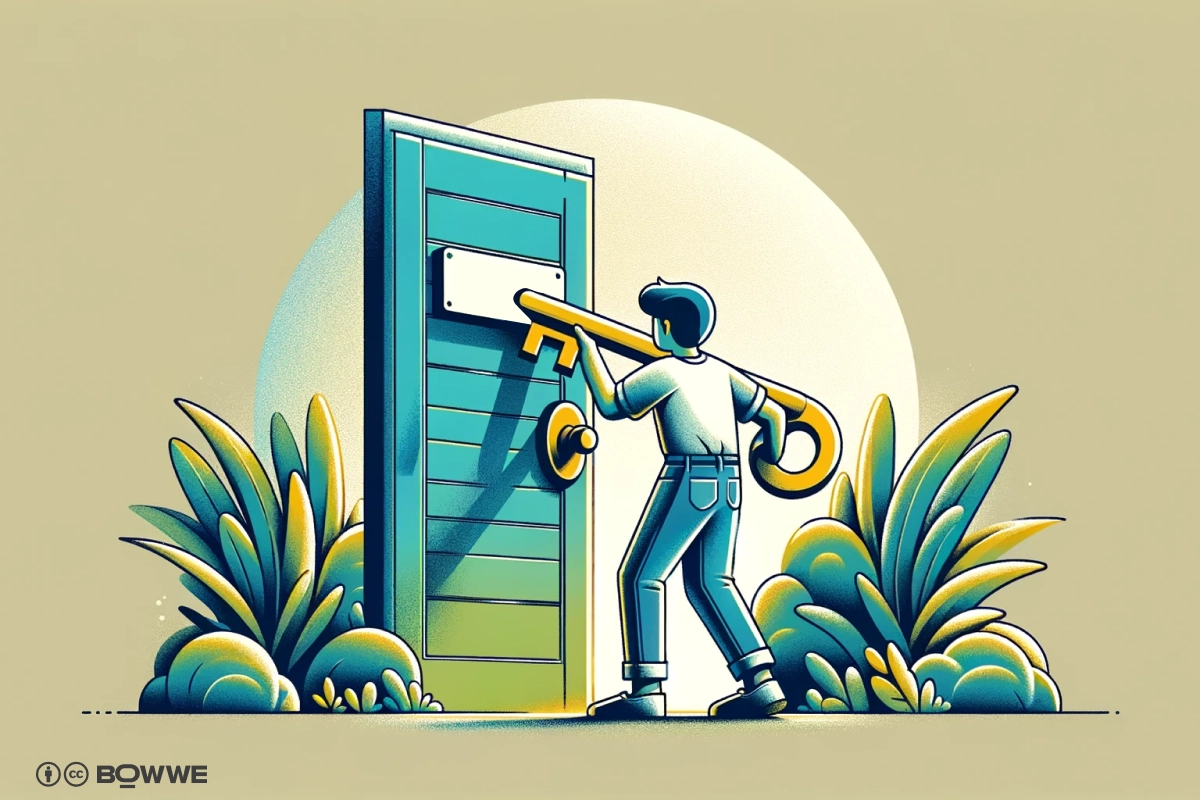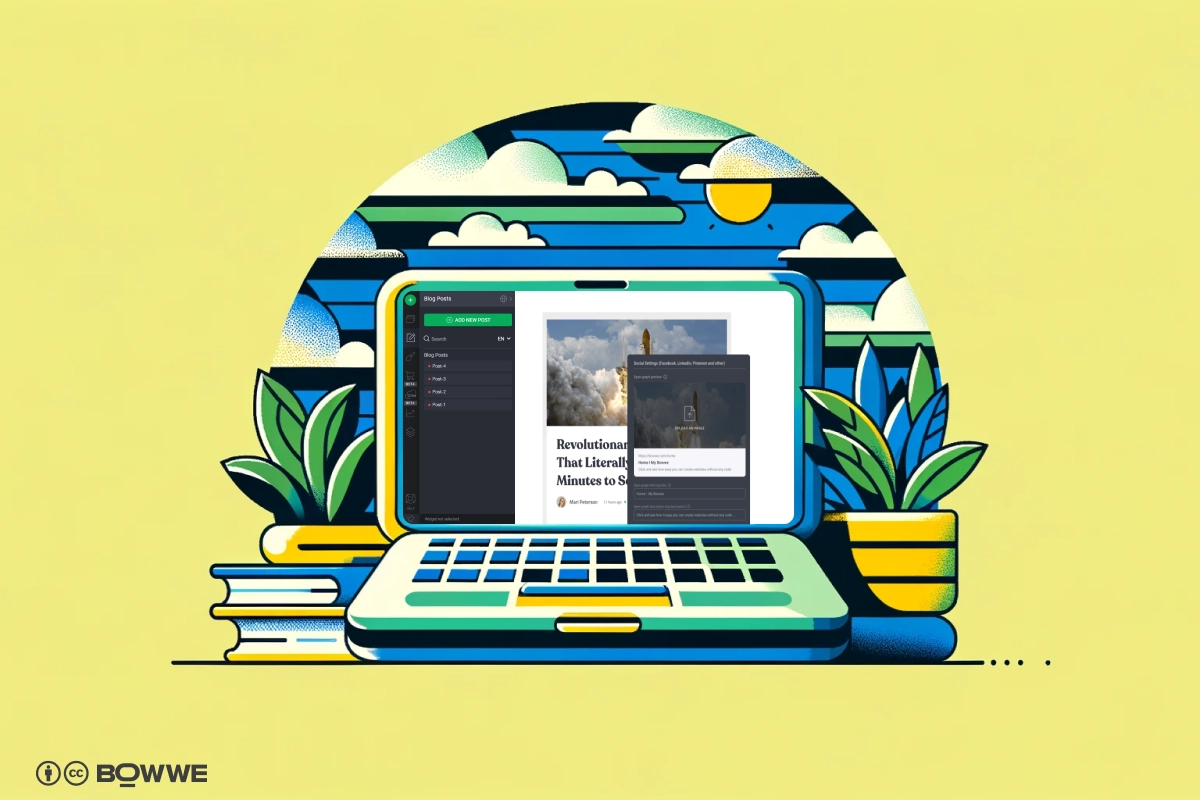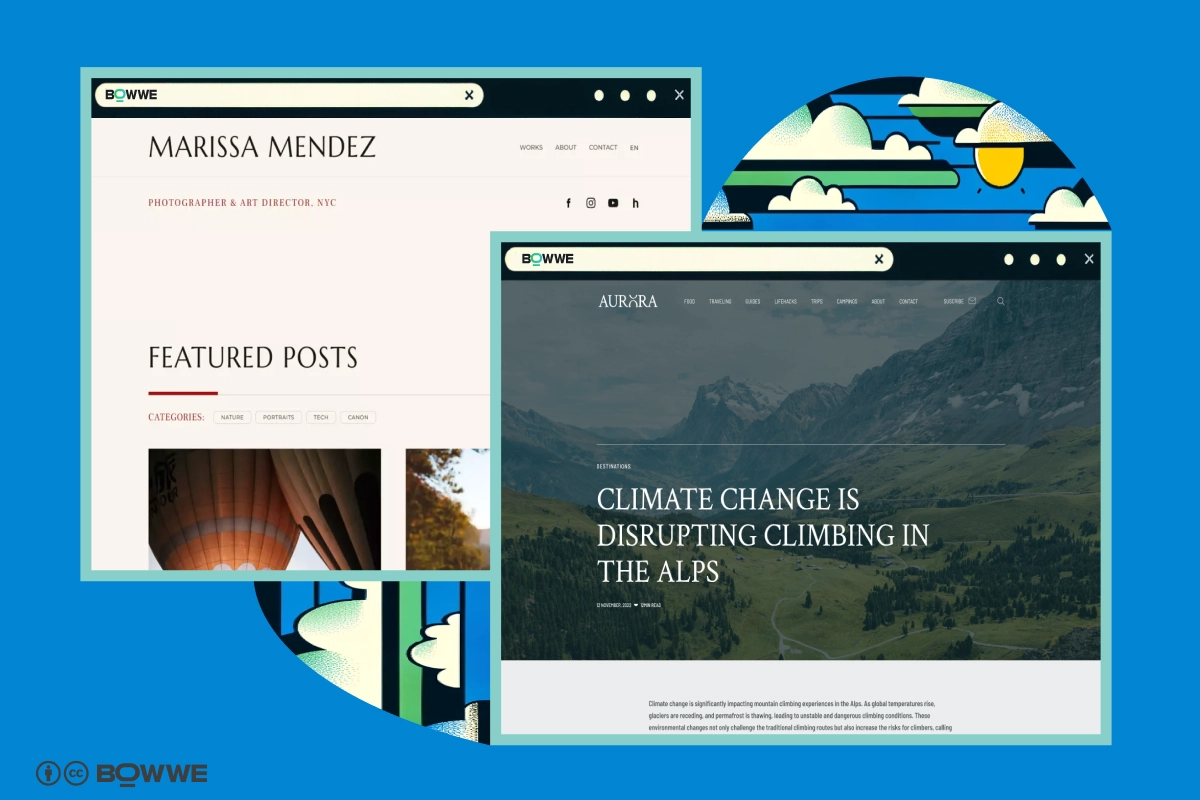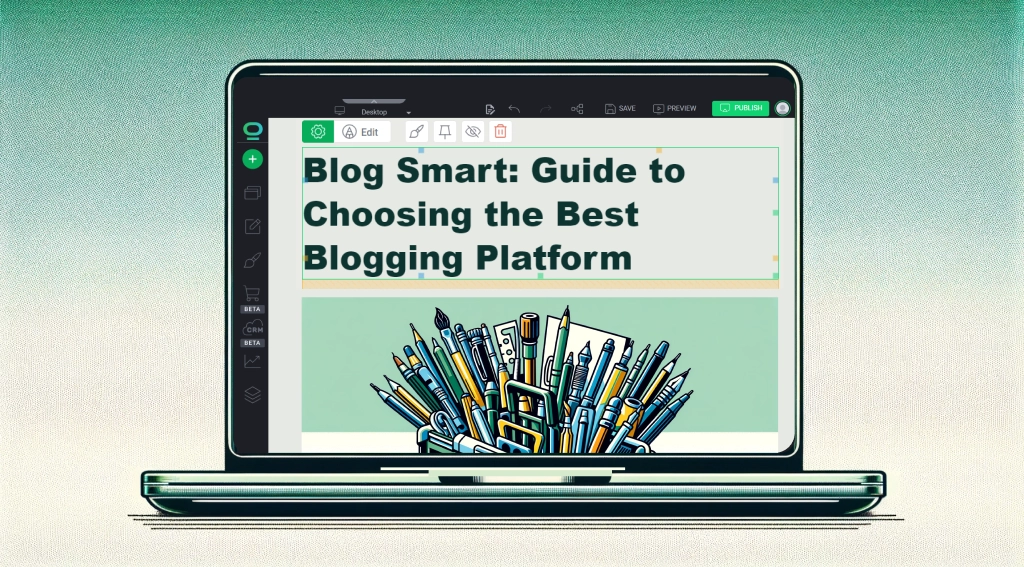Blogging has exploded in popularity over the past decade, with millions of people creating blogs to share ideas, promote their businesses, or simply document their interests and lives. More and more companies are also using blogs for content marketing, search engine optimization, and driving traffic to their websites. With this rapid growth, the choices for blogging platforms have greatly expanded as well.
In this article, you will learn about key criteria such as ease of use, features, monetization capabilities, audience engagement, SEO optimization, scalability and more to evaluate popular blogging platform options.
Let’s get started in learning how to choose the best blogging platform for YOU - whether you’re just starting out or looking to take your existing blog to the next level!
Start Now!
The real impact of blogging
With over 600 million blogs out of the 1.9 billion websites worldwide, the blogging landscape is vast and diverse. Authors are producing over 6 million blog posts daily, totaling over 2.5 billion annually. This immense volume highlights not just the popularity of blogging but also its potential as a powerful communication tool.
Blogging has evolved from simple text entries to a multifaceted tool used for a range of purposes. This evolution is evident in the platforms' advanced features like SEO tools, social media integration, and e-commerce capabilities. Interestingly, 70% of people prefer to receive information from blogs over traditional advertisements, indicating a shift in how consumers prefer to engage with content.
Moreover, 68.52% of respondents believe that blogs add credibility to a website, highlighting the importance of blogging in establishing trust and authority online. For B2B companies, this is particularly noteworthy, as they receive twice as much revenue from organic search, a key component of blogging, than from any other channel.
The importance of choosing a blogging platform based on needs
For personal bloggers, the ideal platform might be one that emphasizes ease of use, visual appeal, and community engagement. Consider, for example, a travel blogger who prioritizes stunning visuals and storytelling. A platform with exceptional image handling capabilities and a layout that brings stories to life would be more suitable than one that focuses heavily on technical aspects.
On the other hand, businesses and professional bloggers need to think beyond aesthetics. Platforms offering robust analytics and strong SEO features are indispensable for them. These tools not only enhance visibility in a crowded digital space but also provide valuable insights into audience behavior and content performance. A B2B company, for example, might choose a platform that integrates well with other marketing tools and offers detailed analytics to track the ROI of their blogging efforts, capitalizing on the fact that B2B companies earn twice as much revenue from organic search compared to other channels.
The key is to select a platform that not only caters to your current requirements but also has the scope to support your blog as it evolves.
8 key criteria for evaluating blogging platforms

1. Ease of use and learning curve
Ease of use and learning curve are critical factors when choosing a blogging platform, especially if you are a beginner blogger or simply want to devote more time creating content rather than dealing with technical complexities.
11 Mistakes Of Amateur Bloggers You MUST Avoid!
Ease of use refers to how intuitive and straightforward a platform is to navigate and use, right from the get-go. A user-friendly platform allows you to set up your blog quickly, with minimal fuss. It means having a clear, intuitive interface where things are easy to find and use.
The learning curve, on the other hand, is about how quickly you can become proficient in using a platform to its full potential. A steep learning curve can be daunting; it can mean more time spent learning the ins and outs of the platform and less time actually blogging. Beginners, or those juggling blogging with other commitments, often prefer a platform that they can easily get the hang of without requiring extensive tutorials or technical know-how.
The key is to find a balance between simplicity and the functionality you need. While ease of use is important, you don't want to sacrifice essential features for simplicity. The ideal platform is one that not only makes it easy to get started but also grows with you as your blogging skills and needs evolve.
2. Features and customization options
The features and customization capabilities offered by a blogging platform should also be key considerations. After all, your blog needs to reflect your unique brand, interests and objectives. At a minimum, look for a platform that offers:
- Responsive templates to optimize viewing on all devices
- Drag and drop builder for easy customization
- Blogging-focused features like categories/tags, comments and subscriptions
- Built-in SEO tools for improved search visibility
- Analytics to track traffic and engagement
- Media galleries to manage images and videos
- Add-on functionality through plugins and integrations
The right blend of usability and extensibility will fuel your blogging journey from initial setup to long-term success!
3. Costs and monetization capabilities
Cost is often a major factor when selecting a blog builder, especially when just starting out. Many bloggers also want to eventually monetize their blog to offset costs or even generate income. So it's important to assess both the initial and ongoing costs as well as monetization options.
Many well-known blogging platforms offer free tiers to allow you to get started at no cost. These are easy low-barrier-to-entry options, however the free plans are quite limited in features and customization capabilities. For some it won't be a big problem.
Self-hosted open source solutions like WordPress.org provide tremendous capability and control but require paying for web hosting, a domain and handling technical management. Without advertising or traffic thresholds, monetizing these blogs via display ads, affiliate links or products can also be challenging initially.
That's why flexible blog builder solutions like BOWWE balance ease of use with monetization support for bloggers at all stages. BOWWE offers free domains and basic blog hosting plans to test the waters. When you're ready to upgrade, premium plans unlock additional storage, custom domains, advanced design tools, removal of BOWWE branding and more options for building revenue streams out of your blog!
4. Audience building and community engagement
A great blog needs more than just great content - it requires building an audience and engaging community. Selecting a blogging platform that actively supports connecting with readers is key.
Look for built-in features like:
- Email subscriptions to foster followers
- Comment sections to enable interactions
- Forums or community options to facilitate discussions
- Integration with social media platforms like Facebook and Twitter for expanded reach
- Contact or newsletter sign up forms to grow mailing lists
Many free blogging sites offer limited options to own your audience data or relationships. For example, comment capabilities may be dependent on the platform. So keep it in mind to always check at what conditions you can use available features!
5. SEO optimization and integrations

Search engine optimization (SEO) is crucial for driving traffic to your blog from Google and other search engines. Thus, optimizing your blogging platform for discoverability and integrations with SEO tools is important.
Seeking a platform with built-in SEO capabilities like metadata editing, XML sitemaps, ALT tag assignment and SEO-friendly permalinks prevents needing external optimization.
When your blogging platform will automatically generate XML sitemap it would make it easier for search engines to crawl and index your content. This means that when you publish a new blog post, it will be quickly discovered by search engines like Google.
In the case of SEO-friendly links, imagine that instead of a generic URL like "blog.com/post123", you can have a descriptive URL like "blog.com/healthy-smoothie-recipes".
Choose a blogging tool that contains SEO tools tailored to your needs. In BOWWE, for example, you have access to a basic SEO module, which is perfect for beginner bloggers, as well as for those who treat blogging as a side hobby, and for those who combine blogging with their work, there is a Rocket SEO module with more advanced functionalities and greater control over the technical layer of the website.
Also, seamless connections with leading digital marketing suites like Google Analytics 4, Meta Pixel, Facebook Ads and more will give you growth leverage.
6. Scalability and growth options
Imagine starting small, with a simple, perhaps even free, platform. As your blog begins to gain traction, you'll want to ensure that your platform can handle this growth. For instance, an aspiring blogger-entrepreneur may initially need basic features, but as their blog grows in popularity, they'll require more advanced tools like enhanced analytics and SEO capabilities - it will be perfect if they will be able to have access to all of it without moving to another platform.
Monetization is another critical aspect for many bloggers, especially for those looking at blogging as a potential income source. The ideal platform should support various monetization options, such as e-commerce integration, ad placements, or affiliate marketing. This flexibility allows bloggers to seamlessly integrate new revenue streams as their audience grows.
As your blog becomes more popular, increased traffic is a given. Your chosen platform should be able to handle this surge without compromising site performance. This is particularly vital for corporate bloggers and expertise-builders, whose blogs might experience traffic spikes during product launches or promotional campaigns. A scalable platform ensures that the blog remains stable and responsive, regardless of the number of visitors. Also remember that many platforms have a limit on the number of visitors for individual plans in their price lists. Be sure to check whether if your blog grows, your growth will not be blocked by visitor limits or too expensive options to increase existing limits.
7. Blog template options

Ready-made blog templates can make launching your blog exponentially easier, saving tons of time and design work. Evaluating the template galleries and customization capabilities should factor into your blogging platform decision. Look for a platform with a wide collection of responsive templates spanning niche blog categories (food, fashion, travel, etc.).
Easy drag and drop builders to restyle headers, icons, fonts and other design aspects in these templates is also vital. No one template will perfectly match your desired branding or content structure. For example in BOWWE you have the ability to easily edit blog templates without the need of coding knowledge and time-consuming process.
8. User experience and support
A platform that nails the user experience (UX) aspect ensures a smooth journey not just for you as a content creator, but also for your audience, enhancing their engagement and retention. This critical facet of blogging sites, coupled with the support they offer, forms the backbone of your blogging venture's success.
A platform that's easy to use allows bloggers to focus on creating great content without getting bogged down by technical complexities. This user-friendliness also makes it easier for readers to navigate and engage with the blog.
As your blog grows, having access to reliable customer support becomes essential. A good support team can help you navigate challenges and improve your blogging skills.
Additionally, being part of a blogging platform with an active community and resources like forums and tutorials can be invaluable for learning and inspiration.
Top blogging platform options

1. WordPress
WordPress is a free, open-source content management system (CMS) that powers a significant portion of websites on the internet. It's renowned for its versatility, allowing users to create everything from simple blogs to complex websites. WordPress comes in two flavors: WordPress.com, which is a hosted solution, and WordPress.org, a self-hosted option that gives users more control over their sites.
1.1. Pros of WordPress
- WordPress offers a vast array of plugins, enabling users to add all sorts of functionalities to their site, from SEO tools to social media integration.
- Being one of the most popular platforms, WordPress has a massive community of users and developers. This means accessing a wealth of knowledge, tips, and troubleshooting advice is relatively easy.
- WordPress offers a vast array of user-made templates, known as themes, catering to a wide range of styles and functionalities. These themes range from simple and elegant designs to complex and feature-rich layouts.
1.2. Cons of WordPress
- While WordPress is incredibly powerful, its vastness can be overwhelming for beginners. Understanding its ins and outs takes time and effort.
- With a self-hosted WordPress site, you're responsible for updates, backups, and security, which can be daunting and time-consuming.
- While WordPress itself is free, costs for hosting, themes, premium plugins, and potential development work can add up.
2. Blogger
Blogger is a free blogging service provided by Google. It offers a quick and easy way for individuals to start a blog without any upfront investment. One of its main attractions is its integration with other Google services, like Google Ads and Analytics, allowing users to monetize their blogs and track performance easily.
2.1. Pros of Blogger
- Being a free platform, Blogger is a common choice for those who want to start a blog without any financial commitment.
- Blogger is user-friendly, with a simple, intuitive interface that makes setting up and managing a blog straightforward.
- As a Google product, it seamlessly integrates with other Google services, which can be a significant advantage for managing and monetizing your blog.
2.2. Cons of Blogger
- Blogger offers limited options when it comes to customizing the look and functionality of your blog. This can be a drawback for those wanting to create a more unique or professional online presence.
- For blogs looking to expand significantly or require advanced features, Blogger’s capabilities might fall short.
- Since blogs are hosted on Google’s platform, there are concerns about blog ownership and control. Google has the authority to suspend or remove Blogger sites if they violate its terms of service.
3. BOWWE
3.1. Pros of BOWWE
- BOWWE supports multilingual websites and projects, making it an ideal choice for global reach.
- Blog builder comes equipped with powerful SEO tools to boost a website's position in search engine results, driving valuable traffic to your site.
- The platform's drag-and-drop editor allows for easy updates and modifications, backed by clean and professional code.
- All pages created in BOWWE are responsive and automatically adapt to mobile devices, ensuring a seamless user experience across all platforms.
- The biggest advantage of BOWWE is its accessibility. It allows anyone to create pixel-perfect projects without any specialized IT skills.
3.2. Cons of BOWWE
- While BOWWE is user-friendly, mastering its more sophisticated features and customization options might require some time for complete beginners.
- For users looking to heavily focus on e-commerce, BOWWE, while capable, might not offer as many specialized features as some e-commerce-centric platforms.
4. Medium
Medium is a publishing platform that focuses on the reading and writing experience. It's not just a blogging tool; it's a community where writers, journalists, experts, and enthusiasts share their thoughts and stories. Medium is known for its clean, minimalist design, which puts content front and center, free from the distractions of complex layouts and designs. You can think about Medium as some kind of social media platform for bloggers.
4.1. Pros of Medium
- Medium's editor is straightforward and easy to use, making the process of writing and publishing content hassle-free.
- Medium has a large, engaged community. Publishing on Medium means you have potential access to this audience, which can be beneficial for exposure and engagement.
- The platform is renowned for its aesthetic appeal, offering a clean, distraction-free environment that's conducive to reading and writing.
4.2. Cons of Medium
- Medium’s options for monetizing your blog are restricted. The platform has its partner program, but opportunities for ads, affiliate marketing, or selling products are limited.
- Medium offers limited customization in terms of design and branding. Your blog will largely look like every other Medium publication.
- Your content's visibility depends significantly on Medium’s algorithm, which can sometimes make it challenging to reach your desired audience consistently.
5. Tumblr
Tumblr is a microblogging and social networking website known for its ease of use and a strong sense of community. It allows users to post multimedia and other content to a short-form blog, offering a blend of blogging and social media. With its customizable templates and user-friendly interface, Tumblr is popular among artists, creatives, and those looking to share thoughts quickly and interact with a like-minded community.
5.1. Pros of Tumblr
- Tumblr's platform is incredibly user-friendly, allowing quick and easy posting of content. Its social nature facilitates interactions, reblogging, and a strong sense of community among users.
- Tumblr offers various themes and customization options, making it possible to personalize your blog to reflect your style.
- With a strong mobile presence, Tumblr is ideal for bloggers who prefer to post and interact on-the-go.
5.2. Pros of Tumblr
- Tumblr does not offer as many options for monetization as some other platforms, which can be a drawback for those looking to make income from their blogs.
- Due to its informal and social media nature, Tumblr may not be the best platform for more professional or business-oriented blogs.
- Tumblr's SEO capabilities are not as robust as other platforms, which could affect the visibility of content in search engine results.
Best blogging platform - summary
Remember, your blog is a reflection of your unique voice and journey. Picking the right blogging platform is key – it's not just where you write, it's how you connect with your readers. Whether it's personal stories, expert advice, or creative expressions, the right platform brings your words to life, making them resonate with your audience.
So go ahead, pick the platform that fits you best, and start your blogging adventure. With the right tools and the world as your audience, there's no limit to what you can share!
Start Now!
Website for blogging - FAQ
Which platform is best for creating a blog?
The best platform for creating a blog depends on your specific needs and goals. WordPress is widely favored for its flexibility and customization options. Platforms like Blogger and Tumblr are great for beginners due to their ease of use. For those seeking a balance between ease and advanced features, BOWWE is an excellent choice. Consider factors like customization, ease of use, SEO tools, and monetization options when choosing.
What type of blog should I start?
The type of blog you should start depends on your passions, interests, and expertise. Popular blog types include lifestyle, food, travel, fashion, technology, and personal finance. Consider niches you are knowledgeable about and topics you are passionate about. This ensures that you can produce content consistently and with genuine interest.
How do I figure out what I want to blog about?
To figure out what to blog about, consider your interests, hobbies, and areas where you have expertise or unique perspectives. Think about topics you enjoy discussing, activities you are involved in, or questions people often ask you. Finding a niche that you're passionate about will make blogging more enjoyable and sustainable.
How can I start blogging as a beginner?
To start blogging as a beginner:
- Choose a blogging platform that suits your needs (for example BOWWE).
- Pick a niche or topic you are passionate about.
- Set up your blog, choose a domain name and a design template.
- Start creating content, focusing on quality and consistency.
- Learn basic SEO to make your blog more visible.
- Engage with your audience and build a community.
What blogging platform features should I consider?
When choosing a blogging platform, consider features like ease of use, customization options, SEO tools, social media integration, mobile responsiveness, monetization capabilities, and customer support. Also, think about long-term scalability – whether the platform can grow with your blog.
Is there a free blogging platform?
Yes, there are free blogging platforms available. Blogger and WordPress.com offer free versions with some limitations. Tumblr is also free and integrates social networking. But BOWWE is a fully blogging-focus free tool ideal for every blogger's needs.
How do bloggers get paid?
Bloggers get paid through various methods, including:
- Advertising revenue (e.g., Google Ads)
- Affiliate marketing (earning a commission for promoting products)
- Sponsored content (paid posts by brands)
- Selling products or services
- Offering subscriptions or exclusive content
How can I make my blog popular?
To make your blog popular:
- Consistently produce high-quality, valuable content.
- Use SEO strategies to increase visibility.
- Engage with your audience through comments and social media.
- Network with other bloggers and collaborate.
- Promote your blog on social media platforms.
- Offer unique perspectives or insights to stand out.
How long does it take before a blog becomes popular?

Karol is a serial entrepreneur, e-commerce speaker m.in for the World Bank, and founder of 3 startups, as part of which he has advised several hundred companies. He was also responsible for projects of the largest financial institutions in Europe, with the smallest project being worth over €50 million.
He has two master's degrees, one in Computer Science and the other in Marketing Management, obtained during his studies in Poland and Portugal. He gained experience in Silicon Valley and while running companies in many countries, including Poland, Portugal, the United States, and Great Britain. For over ten years, he has been helping startups, financial institutions, small and medium-sized enterprises to improve their functioning through digitization.





x600.webp)



